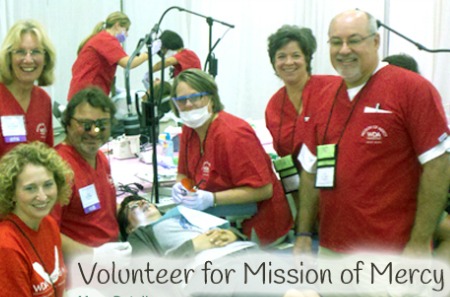
Dentists try to make up for Medicaid shortfalls, other holes
in oral health safety net during two-day charitable event
More than 300 Michigan Dental Association dentists – many from Southeast Michigan – and hundreds of other volunteers will begin treating an expected 2,000 disadvantaged people starting Friday in the state’s first Mission of Mercy (MOM) event to provide dental care to people without other options.
Patients are expected to begin lining up Thursday night at Saginaw Valley State University’s Ryder Center to receive treatment on a first-come, first-served basis during the two-day event, which ends Saturday. Priority is given to adults and children in pain and with infections. It is expected to be the state’s largest dental access event.
“Michigan is joining the 25 other states that have held Mission of Mercy events in an attempt to get disadvantaged children and adults the dental care they so desperately need,” said Dr. Steve Harris, a Farmington Hills dentist and chairman of the Michigan Mission of Mercy. “We are committed to seeing 1,000 patients each day, and while we know the access problem is much bigger than that, we want to make sure we are doing everything we can to solve it.”
“This obviously is not a solution to Michigan’s access to care problem,” said Dr. Norm Palm, MDA president and a Grand Rapids oral surgeon. “Safety net clinics and the state’s Medicaid program must be adequately funded to serve the more than 1.8 million Michigan children and adults who qualify for Medicaid.”
“There are many individuals in desperate need of dental services in our community,” said Sharon Mortensen, president and CEO of the Midland Area Community Foundation. “It’s heartening to see hundreds of volunteers, local organizers and the Michigan Dental Association working together to help meet that need.”
Patients can receive fillings, extractions, cleanings and certain other procedures as needed. They cannot receive bridges, crowns, dentures, implants or orthodontics. If patients experience complications in the days immediately following the clinic, some local dentists and clinics have agreed to see MOM patients for emergency follow-up care.
In addition to dental treatment, patients will receive information about the importance of good daily oral hygiene, a healthy diet and routine preventive dental care.
“Education is the most cost-effective way to reduce oral disease, so we want to make sure patients are armed with information that allows them to take charge of their oral health,” said Dr. Connie Verhagen, a Muskegon pediatric dentist who was instrumental in bringing MOM to Michigan. “Our ultimate goal is for patients to receive regular preventive care so they do not have to rely on events such as this.”
It costs about $180,000, including in-kind donations, to hold the 100-chair clinic over the two days. Donations include grants, private contributions, dental supplies, meals and snacks, tables and chairs, office supplies and other items.
MOM is a joint project of the MDA and MDA Foundation. Major sponsors include Delta Dental, Blue Cross Blue Shield Foundation, Dow Corning Donor Advised Fund, Midland Area Community Foundation, Patterson Dental and Rollin M. Gerstacker Foundation, and 135 others.
For more information about MOM go to www.smilemichigan.com/foundation.
About the Michigan Dental Association:
The MDA works to educate the public about oral health, promotes the science and art of dentistry, and provides educational materials and services to its 5,500 members, enhancing their ability to provide quality care. For more information, visit www.smilemichigan.com.
Michigan Mission of Mercy: How it works
· Patients complete registration and health history forms.
· Patients receive one-on-one oral health education.
Patients go to “medical triage,” where it is determined whether they have medically compromising conditions (extremely high blood pressure, severe untreated diabetes, etc.), which means they cannot be treated.
Patients go to dental triage, where their dental needs are identified.
Patients are referred to one of six clinic areas:
o oral surgery
o restorative
o endodontic
o pediatric
o prosthodontics
o hygiene
Patients then go to an in-house pharmacy for antibiotics and non-narcotic pain medication, as needed.
Patients have an exit interview where they receive post-op instructions and an oral health kit to take home, as well as information on where to go for follow-up dental care.